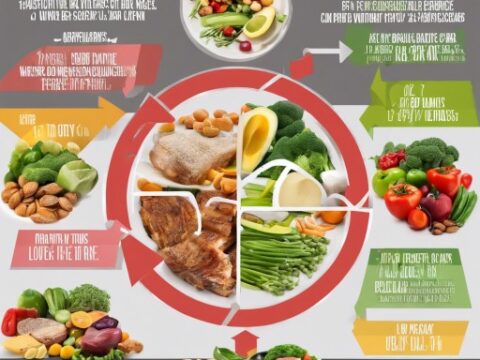
How Your Diet Can Impact Your Mood and Mental Well-Being
Have you ever experienced a sudden boost of happiness after a satisfying meal or felt mentally drained after indulging in junk food?
Well It turns out that what you eat does not only affect your physical health but also has a significant impact on your mood and overall mental well-being.
In this blog post, we will delve into the fascinating connection between nutrition, diet, and their effects on our emotional state. Get ready to discover how your food choices can influence not just your waistline but also your happiness and mental balance!
The Gut-Brain Connection
You may be surprised to learn that your gut and brain are constantly communicating with each other. This connection is known as the gut-brain axis, and it’s a bi-directional communication system that involves both physical and biochemical pathways. The gut, often referred to as the second brain, contains millions of neurons that produce various chemicals responsible for mood regulation.
The Impact of Macronutrients on Mood
Lets break down the impact of different macronutrients on your mood and mental well-being:
Carbohydrates:
Many comfort foods rich in carbohydrates, like pasta or sweets, provide a rapid boost in serotonin levels, known as the feel-good hormone. However, these mood-enhancing effects may be short-lived and often followed by energy crashes and mood swings. Opt for complex carbohydrates such as whole grains, fruits, and vegetables, which release energy gradually and promote sustained mental wellness.
Proteins:
Essential amino acids found in protein-rich foods play a crucial role in the production of neurotransmitters like serotonin and dopamine. These brain chemicals contribute to feelings of happiness and motivation. Incorporate lean sources of protein, including poultry, fish, legumes, and tofu, into your diet to support optimal brain function and maintain a stable mood.
Fats:
While its important to choose healthy fats over unhealthy ones, not all fats are created equal. Omega-3 fatty acids, commonly found in fatty fish like salmon, walnuts, and flaxseeds, have been linked to improved mood and decreased risk of depression. On the other hand, trans fats and saturated fats, typically found in processed and fried foods, have been associated with a higher likelihood of mental health issues. Remember to consume fats in moderation and prioritize those that promote brain health.
The Role of Micronutrients in Mental Well-Being
Beyond macronutrients, micronutrients also play a significant role in maintaining a healthy mind. Lets explore the impact of some essential vitamins and minerals:
1. B Vitamins:
The B-vitamin complex, including vitamins B6, B12, and folate, is involved in the synthesis of neurotransmitters like serotonin and dopamine. Low levels of these vitamins have been associated with higher rates of depression and anxiety. Incorporate foods like leafy greens, whole grains, legumes, and lean meats into your diet to ensure an adequate intake of B vitamins.
2. Vitamin D:
Deficiencies in vitamin D have been linked to an increased risk of mood disorders. This vitamin plays a crucial role in regulating serotonin levels in the brain. When sunlight exposure is limited, consider incorporating dietary sources such as fatty fish, fortified milk, and egg yolks, or consult your healthcare provider regarding supplements to maintain optimal vitamin D levels.
3. Minerals:
Several minerals, including magnesium, zinc, and iron, are essential for brain health. Magnesium, found in foods such as nuts, seeds, and leafy greens, has been shown to play a role in reducing symptoms of depression and anxiety. Likewise, zinc and iron deficiencies are linked to poorer mental health outcomes. Ensure a balanced intake of these minerals through a varied diet or consult a healthcare professional if you suspect a deficiency.
The Gut Microbiome and Mental Health
In recent years, there has been growing focus on the gut microbiome and its influence on mental health. The trillions of bacteria in our gut are responsible for various physiological processes, including the production and regulation of neurotransmitters.
Studies suggest that a healthy gut microbiome, characterized by a diverse range of beneficial bacteria, may positively impact our mood and overall mental well-being. To support a healthy gut, incorporate fiber-rich foods like fruits, vegetables, and whole grains, as they serve as prebiotics, nourishing the good bacteria in your gut.
Tips for Optimizing Your Diet for Mental Well-Being
1. Prioritize nutrient-dense foods:
Opt for a diet rich in fruits, vegetables, whole grains, lean proteins, and healthy fats. These wholesome foods provide essential nutrients that support brain health and ensure overall well-being.
2. Minimize processed and sugary foods:
Highly processed foods, including fast food, sugary snacks, and sodas, may have a negative impact on your mood and mental health. Reduce their consumption and replace them with whole, unprocessed alternatives.
3. Practice mindful eating:
Take the time to savor and appreciate your meals. Mindful eating not only enhances your connection with food but also helps regulate portion sizes and prevents emotional eating.
4. Stay hydrated:
Dehydration can lead to mood fluctuations and cognitive decline. Maintain adequate hydration throughout the day by drinking plenty of water, herbal teas, and consuming water-rich foods like fruits and vegetables.
5. Seek professional guidance:
If you are struggling with mental health issues or suspect nutrient deficiencies, consult a healthcare professional, such as a registered dietitian or a mental health specialist. They can provide personalized guidance tailored to your needs.
Conclusion
It is remarkable to realize how closely intertwined nutrition, diet, and mental well-being are. The foods we consume have a direct influence on our mood, energy, and overall mental state. By making conscious choices to prioritize nutrient-dense foods, staying hydrated, and nourishing our gut microbiome, we can positively impact our emotional well-being.
Remember, a healthy mind starts with a healthy diet. So, why not embark on this journey to nourish both your body and soul? Your taste buds and mental health will thank you for it!




